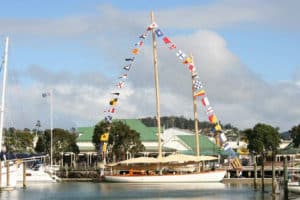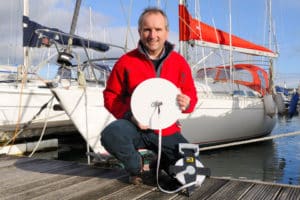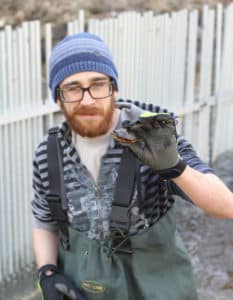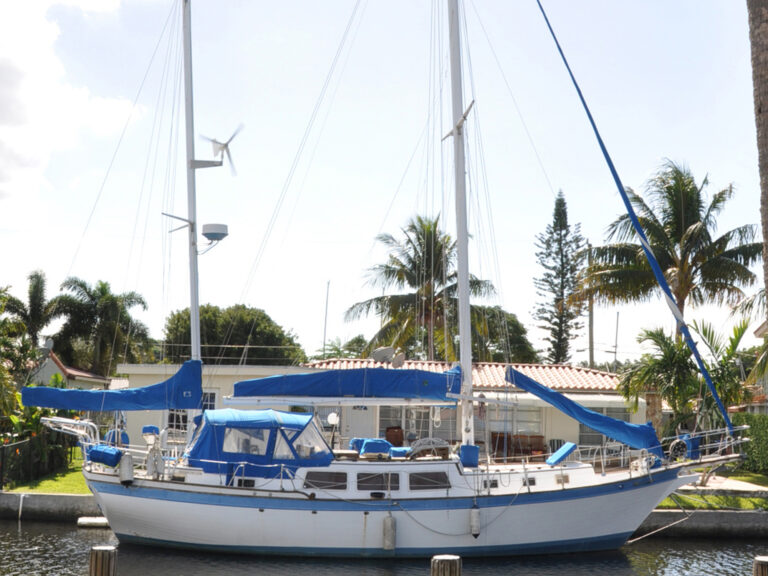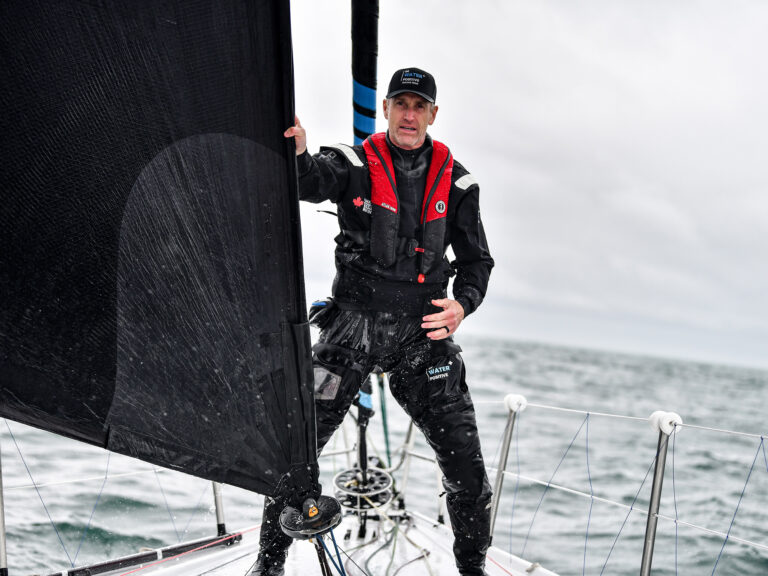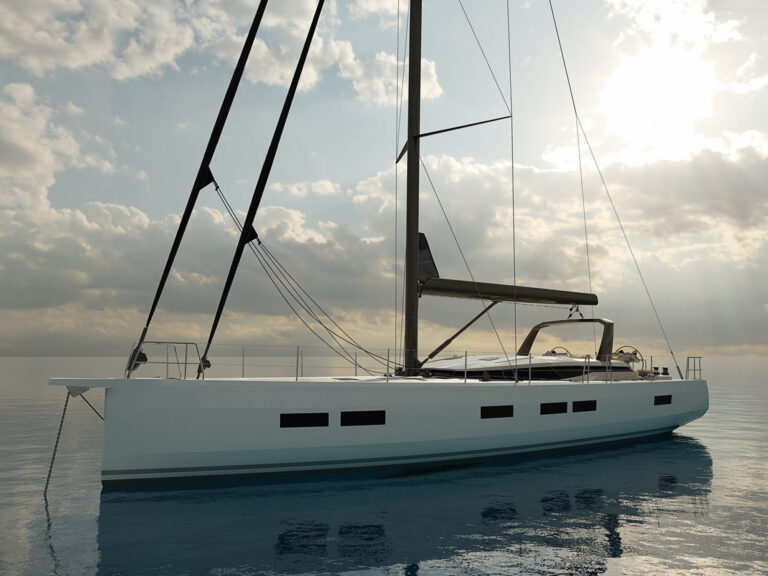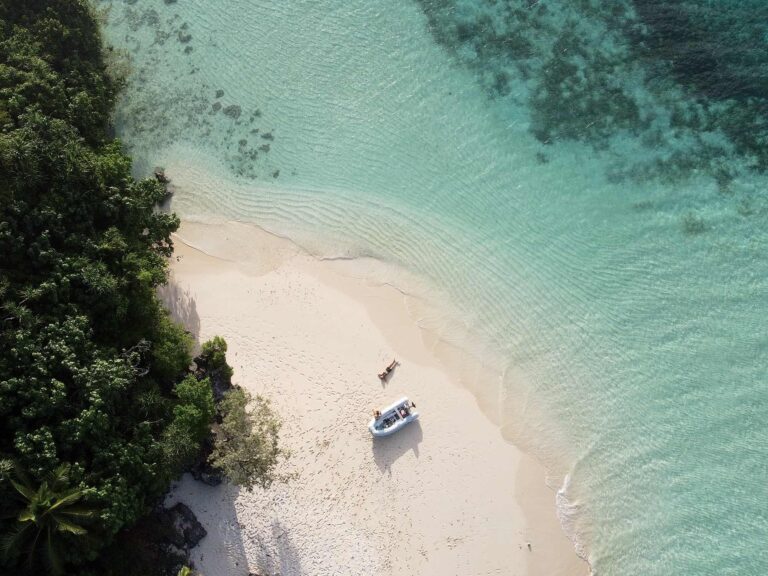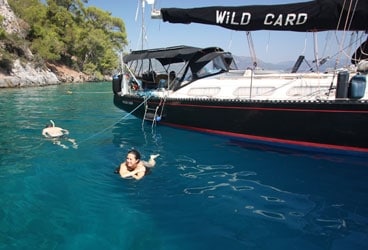
Boats n Babies 368
It was a calm, hot day in Skopea Limani, Turkey, and perfect for swimming, napping, and discussing potential baby names. I gave a lazy yawn and said, “Tiller, I think, is the perfect name for a boy.”
“And if it’s a girl?” our pregnant daughter, Roma Orion, asked. She was treading water-a bit awkwardly-beside our anchored 38-foot S&S-designed cutter, Wild Card. Christian, her husband, sat next to me in the cockpit. He was nursing a beer.
“Well, if it’s a girl,” I said, “I favor the name Patience because a sailor is patient above all else. Patience is something we all need more of.”
We were in the middle of yet another languid family cruise, this time along the southern coast of Turkey. A couple of months ago, it was Israel. Before that, it was Thailand. In fact, most of the time I’ve spent with my son-in-law has been in cruise mode, as he calls it. I’m always a bit taken aback to see him in an Armani suit, jetting around the world making business deals.
“I don’t know, Fatty,” Christian said. “Tiller is a bit unusual. I was thinking more of a name like Brenda or Bob or, you know, something normal.”
“That’s funny,” scoffed our daughter, “coming from a fellow who married a Roma Orion and is speaking to a person known as Fatty!”
“Don’t name it after me!” I joked pleadingly. “Master Fat doesn’t have a nice ring, nor does Princess Fatette.”
Christian shook his head. “How in the world did I get tangled up with such a completely nutty family?”
My wife, Carolyn, handed up yet another gourmet snack platter into the cockpit and said to Christian as she emerged, “You must be atoning for a sin in a previous life.”
“Hey,” said Roma, “whose side are you on, Mother?”
Our daughter was a third-generation liveaboard when Christian, a confirmed dirt dweller, swept her off her Top-Sider-clad feet. It was a shock. We raised her as a wild child in smoky Caribbean rum shops, and she gets hitched to a lily-white Catholic with a shore job? Weird!
“Are we ready for our afternoon hike?” I asked. “Just over the ridgeline is Tomb Bay. It’s a bit of a climb, but not too tough. We can stop and wait on Roma-the-slowpoke. I understand the sarcophagus there dates back to the 4th century B.C.”
“Wow, that’s even older than you!” said Christian.
“Watch out, young man,” I said with a smile. “When you get the bill from the maternity ward, you might turn gray yourself!”
A few days before this, I’d been beachcombing and came across two local fishermen mending their nets. We chatted for a while, as they wanted to practice their English. Their names were Mustafa and Abdulla. They were brothers who lived in a tiny shack in nearby Kapi Koy. In order to survive economically, they did a number of diverse things: sold freshly baked bread to passing gulets, the traditional Turkish fully-crewed charter boats; fished; tended goats; gardened; collected shellfish.
They were familiar with charterers but intrigued with the boat-as-ocean-home concept.
“You’ve lived aboard for 50 years?” asked Mustafa. “You must be rich!”
“Yes, and 40 of those years have been with my wife, Carolyn,” I said. “But no, I’m not rich. I’m just like you. I work every day to get by. If I don’t work, I don’t eat. Sometimes things go well, and we get a bit of meat with our rice. Other times, it’s hard luck and hard tack, so to speak.”
“Tell us about circumnavigating,” said Abdulla. “What’s your favorite place? What about storms?”
“Our favorite destination? That’s the next one, of course. But Chagos is magic. We enjoyed the rain forests of Borneo. And we loved Madagascar, where they live in mud huts and build elaborate cinderblock graves. Storms? They’ve never been a problem for us. They’re a fact of life, like lightning. They’re beautiful, with a hint of danger. We embrace it all. Life is a package deal.”
Mustafa was the practical one and stayed focused on the money. “But your boat cost a lot, didn’t it? So you must have had a pile of money at some point.”
“Not really. Wild Card’s salvage rights cost $3,000 after Hurricane Hugo,” I said. “She had a one meter by four meter crushed section on the port side and was sunk along the shore of St. John, in the U.S. Virgin Islands. That’s about 4,500 Turkish lira. Her real cost, of course, was in the blood, sweat, and tears we put into her, the same coin of the realm you guys trade in every day here.”
“You don’t have a car?” Abdulla asked. “Your boat, Wild Card, is your only means of transportation?”
“We don’t have a car, just like you,” I said. “Every single thing we own is aboard her. But she isn’t just our transportation. She’s the internal universe we use to explore our external world, Mother Ocean.”
I paused and wondered if I was losing them. Sometimes I get a bit too mystical. But the truth is never wrong, even when it becomes complicated.
“Wild Card is our home, our transportation, our hobby, and our sport,” I said as I plunged on. “Plus it’s my profession. Oh, yeah, and our bomb shelter, should the shore-huggers go collectively nuts. If the food chain is ever interrupted, she could be our breadbasket as well, assuming a few fish are left in the sea. But, that’s only part of it. There’s more. . . .”
My voice trailed off. I couldn’t articulate the full breadth of what my beloved boat was or how much she meant to me. Words seemed a bit thin. But that’s my job as a writer: to capture in words what’s in my heart. And something else was in my heart when I thought of my boat, but it was just out of reach of my consciousness.
When I returned to Wild Card, Roma Orion asked, “Who were you talking to on the beach?”
“Some fisherman,” I said.
“What about?” she pressed.
“Life,” I said. “You know me, Roma. I’m always asking the Big Questions. They’re nice guys. We’re not so different, their horizon is just smaller.”
Skopea Limani (just 12 miles east of Fethiye) has dozens of perfect anchorages. We spent a week exploring them, and ourselves. Ruin Bay had been our favorite because, while Carolyn and Roma conducted girltalk in Cleopatra’s Bath, Christian and I had retired to Wall Bay restaurant and enjoyed cool drinks in the shade of a hot sun.
While we’ve been sailing along Turkey’s southern coast, we’ve discovered that the main difficulty hasn’t been in finding the perfect harbor-it’s been finding one shallow enough for us to anchor. We’d wanted to anchor in Kapi Creek, but it was 300 feet deep just 200 feet off the rocks.
“We’ll anchor stern to,” I said that day to Christian, “and you and Roma can run my stern lines ashore in the dinghy.”
There was no crosswind, so it wasn’t a difficult maneuver.
I first reconnoitered just off some pointed rocks while watching my graphic depth meter intently. Then I had Carolyn lower my anchor and chain 100 feet straight down into the clear, blue Mediterranean water. Next, I backed up to the rocks; I had 100 feet of water depth when we were 200 feet off.
“Pay out the rest,” I said, and Carolyn paid out our full 200 feet of chain.
I continued backing. About 100 feet from the rocks, our anchor took up, and we stopped. Roma and Christian ran two lines ashore and tied them around the rocks with separate short pieces of junk line, so the chafe didn’t matter.
Then Carolyn put us in tension with her anchor windlass; we were snug as a bug in a rug. Even though we only had 2-to-1 scope out, the angle of our chain rode wasn’t bad because of the steepness of the bottom. We were fine in normal conditions and, of course, would leave if bad weather approached.
“Christian,” I said, “just in case some drunk in a powerboat or an idiot on a jet-ski tries to cut between us and the shore, let’s tie something on our stern lines so they won’t get injured.”
Christian took two P.F.D.s and clipped their loose straps around the middle of the stern lines. I knew it wasn’t a perfect solution, but the orange was highly visible, and I didn’t want to be negative. He was coming along fine as a sailor, and I didn’t want to discourage him.
Within the hour, however, both life jackets had walked up close to the boat and were no longer acting as visual warnings. Thus, I had a teachable moment.
“I’m going to attach two fenders to the middle of our shorelines,” I told Christian, “and use a special knot called a rolling hitch so they can’t slip toward the boat in the wave action.”
He carefully observed my actions.
I smiled a smug smile until an hour later when Roma Orion said, “Where’s the port fender, Dad?”
It was gone. My knot would’ve been fine if there was constant pressure on it and it could cinch up, but the gentle wavelets had evidently untied it.
I’d used the wrong knot while pompously lecturing my new son-in-law to not do exactly that.
I tried not to blush. And they kindly tried not to smirk.
But I was internally berating myself. We’d just purchased four brand-new fenders at great expense in Tel Aviv, and for the first time in my entire life, my fenders matched. And now I’d stupidly thrown one away. Damn it!
Then I allowed my thoughts to drift away like mental clouds and refocused on the present.
Roma was giving Christian a tour of the boat, showing him where she slept as a child, stowed her My Little Ponies, and kept her dog-eared schoolbooks. I’m thrilled by their chatter. They are so much in love. “Wild Card has been a part of our family for many years,” she said to Christian.
Bang! It was like a flashbulb had gone off over my head: She’d hit the nail perfectly. My boat was my home and my transportation, yes, but mostly it was about family and friends. My mother and her siblings are extremely tight, having grown up together aboard the schooner Elizabeth. Could Carolyn and I have melded without our boats, Corina, Carlotta, and Wild Card? Would Roma be Roma without the salt water in her veins? Would George Zamiar and Dave Lovik, my two best friends, be that if we hadn’t sailed thousands of miles together over the years?
My boat isn’t about me-she’s about us. A boat isn’t something you buy to “get away” but to move closer toward your family, your friends, and your God.
“Hey!” Carolyn said, and snapped me out of my deep reverie. “We’ve got visitors.”
Everyone rushed out on deck.
At first I didn’t recognize the small fishing boat. Then Abdulla and Mustafa’s grinning faces came into view. They looked odd. Why were they grinning so? And we’d met many days and harbors ago-what were they doing here now?
They’d throttled down and were coming alongside when Abdulla lifted up the missing fender. “We found it drifting in the Domuz cut, heading out to sea,” he said. “I wouldn’t have connected it with you except for the hand-stitched black cover. Wild Card is the only black boat we’ve seen for months. So we hunted around a bit and, well, here you are!”
They refused to take any money even though I knew they were desperately poor.
“Please,” Carolyn said, “come aboard for some Turkish coffee and baklava.”
Once we were all settled in the cockpit, I introduced everyone, and then added, with a first sweep of my arm, “Family.” Then, after another sweep, “Friends!”
All was well with the world. I’d gotten my fender back, thanks to the karma bank I’ve been making small deposits into all my life. And there had been a teachable moment, only I’d been the humbled student, not the pompous teacher. It was I who learned “what knot to do,” as Roma put it in a pun later.
In the end, it all worked out perfectly. Perhaps the best lesson a father-in-law can convey to a son-in-law is that even a captain plays the fool occasionally.
And now my head could verbalize what my heart had known all along: that boats are about family and friends and love as well as sailing from Point A to Point B.
A few hours after Mustafa and Abdulla had left, I suddenly got another inspiration. “Hey,” I said, “I’ve got another baby name for consideration!”
Roma and Christian both swiveled their heads toward me.
“You know my brother, Morgoo the Magnificent, named his daughter Carlotta after the boat Carolyn and I built in Boston.”
“Wait,” said Christian wearily, “I thought it was traditional to name boats after people, not the other way around.”
“Goodlanders do tend to do things backward,” I admitted. Then I said, “How about Corina, if it’s a girl?”
Roma knitted her brow in consideration. Christian smiled, hunted for a politically correct way out, then said graciously, “I like it better than Princess Fatette!”
The Goodlanders will spend Christmas in Finike, Turkey, then fly to Amsterdam to help with the new baby. Cap’n Fatty’s latest book, Red Sea Run: Two Sailors in a Sea of Trouble, will be available at Amazon.com shortly.

